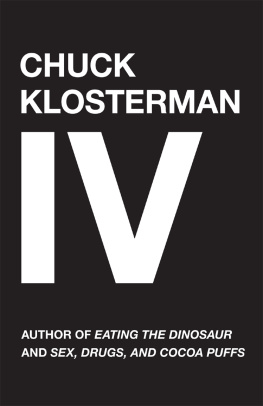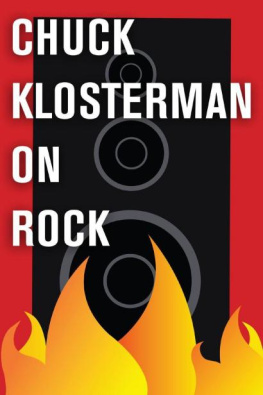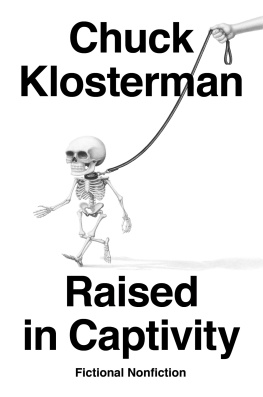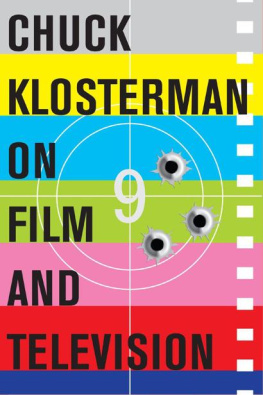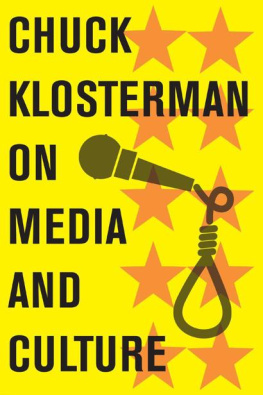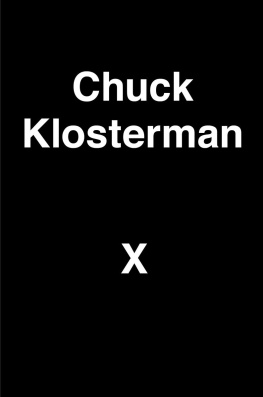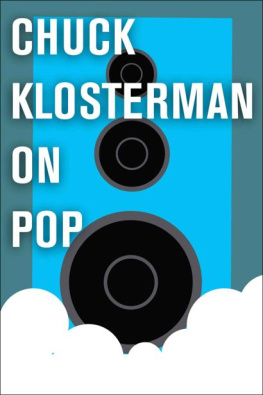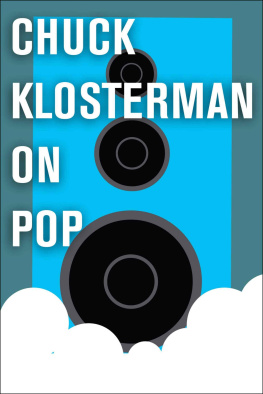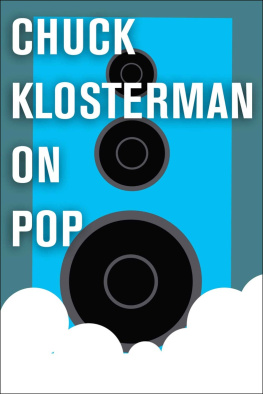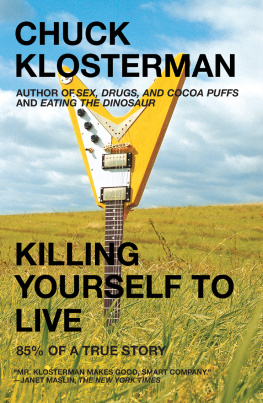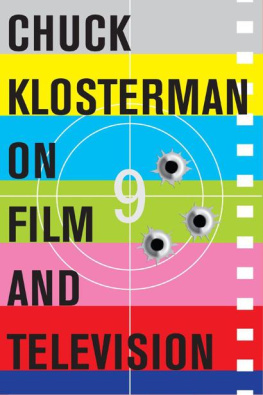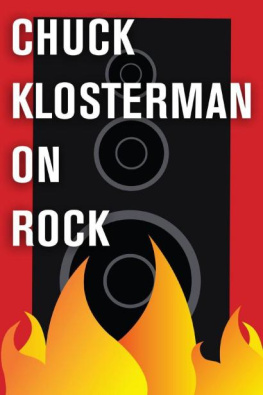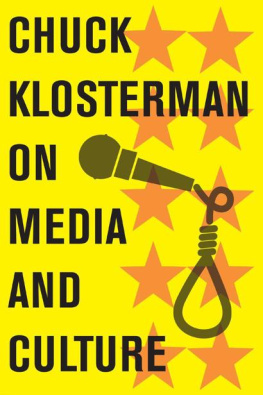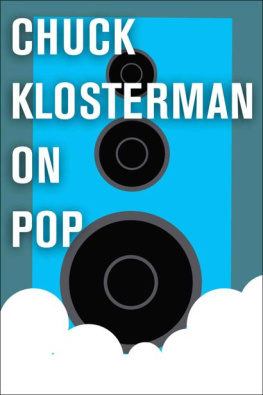Acknowledgments

When given the opportunity to make acknowledgments for the creation of a book, its tempting to list every person youve ever met in your entire life. That was my original intention when I started writing this page, but I suppose thats kind of ridiculous and sort of risky, so Im not even going to try. Instead, Im only mentioning a select few.
The first person I need to thank is my agent, Todd Keithley, who believed in this project with the intensity of a wolverine on crack. I also must mention Matthew Kalash and his associate Sid Jenkins, who innocently introduced me to Todd and changed the course of my career. Im just as thankful for the brilliant work of my editor at Scribner, Brant Rumble, who understood this book immediately and actually seemed to like it, even though it never mentions Liam Gallagher or Greg Maddux.
I would also like to thank the multitudes of people who read this manuscript at its various stages, particularly David Giffels and Michael Weinreb (who both provided the necessary competition) and Ross Raihala (who helped shape the way I think about popular music). I am forever indebted to Mark J. Price, whos got to be the only copy editor in the universe who knows AP style and the original lineup for Stryper. Bob Ethington provided some bonus editing down the stretch. And though I cant mention them all by name, I want to acknowledge my entire family, the UND Posse, my colleagues from the Dakota Student (especially my superfoxy lawyer, Amy Everhart), my past and current coworkers at The Forum newspaper and the Akron Beacon Journal, and everyone else who ever wasted time with me. If weve had more than two conversations, youre probably in this book. I would also like to apologize to any girl Ive ever dated, partially for using you in this story but mostly for anything else I might have done along the way.
Finally, I would like to personally thank everyone who buys this book, and even those of you who just look at it in a bookstore and decide it isnt worth the money. As a writer, there is nothing more flattering than having someone invest their thoughts into something you wrote. And if you hate this book, feel free to call me at home. My phone number is (330) 867-1883. The only thing I ask is that you promise not to talk about heavy metal (except for maybe KISS).

CHUCK KLOSTERMAN is a senior writer at Spin magazine and a columnist for Esquire. He has written for The New York Times Magazine, The Washington Post, The Village Voice, The Believer, and GQ. He is the author of Killing Yourself to Live and Sex, Drugs, and Cocoa Puffs . He resides in New York City.

MEET THE AUTHORS, WATCH VIDEOS AND MORE AT
SimonandSchuster.com
THE SOURCE FOR READING GROUPS
Cover design: O.O.P.S.
Cover photograph Tim Flach/Gettyimages
Cover illustration by Modi Li
Author photograph by Karen Schiely
Register online at www.SimonandSchuster.com for more information on this and other great books.
February 2, 2000
Mr. Charles Klosterman
Dear Mr. Klosterman:
We received a complaint this morning regarding loud music and jumping in your apartment in the early hours of the morning. After reviewing your file, it seems as if this is a recurring problem in your apartment. It distresses us to have to write this letter, but you are keeping your neighbors awake.
We realize that it is sometimes difficult to live with neighbors, but please understand that playing music loudly at any time, if it disturbs your neighbors, is expressly against your lease. Your lack of consideration for your neighbors is also very disrespectful.
Your status as a resident here at Cedarwood Village is very tenuous. You are currently here on a month to month basis. Therefore, if we receive just one more complaint about noise we will give you a 30 day notice to vacate your apartment.
Our hope is that we do not have to take any further action in respect to you disturbing your neighbors. If you have any questions, please give us a call.
Sincerely,
General Manager
October 26, 1983

The worldwide release of Mtley Cres Shout at the Devil .
Its easy for me to recall the morning I was absorbed into the cult of heavy metal. As is so often the case with this sort of thing, it was all my brothers fault.
As a painfully typical fifth-grader living in the rural Midwest, my life was boring, just like it was supposed to be. I lived five miles south of a tiny town called Wyndmere, where I spent a lot of time drinking Pepsi in the basement and watching syndicated episodes of Laverne & Shirley and Diffrent Strokes. I killed the rest of my free time listening to Y-94, the lone Top 40 radio station transmitted out of Fargo, sixty-five miles to the north (in the horizontal wasteland of North Dakota, radio waves travel forever). This was 1983, whichat least in Fargowas the era of mainstream new wave pop (although it seems the phrase new wave was only used by people who never actually listened to that kind of music). The artists who appear exclusively on todays Best of the 80s compilations were the dominant attractions: Madness, Culture Club, Falco, the Stray Cats, German songstress Nena, andof courseDuran Duran (the economic backbone of Friday Night Videos cultural economy). The most popular song in my elementary school was Eddy Grants Electric Avenue, but that was destined to be replaced by Princes Lets Go Crazy (which would subsequently be replaced by Raspberry Beret).
Obviously, popular music was not in a state of revolution, or turbulence, or even contrived horror. The only exposure anyone in Wyndmere had to punk rock was an episode of Quincy that focused on the rising danger of slam dancing (later, we found out that Courtney Love had made a cameo appearance in that particular program, but that kind of trivia wouldnt be worth knowing until college). There were five hundred people in my hometown, and exactly zero of them knew about Motorhead, Judas Priest, or anything loud and British. Rock historians typically describe this as the period where hard rock moved underground, and thats the perfect metaphor; the magma of heavy metal was thousands of miles below the snow-packed surface of Wyndmere, North Dakota.
Was this some kind of unadulterated tranquillity? Certainly not. As I look back, nothing seems retroactively utopian about Rick Springfield, even though others might try to tell you differently. Whenever people look back on their grammar school days, they inevitably insist that they remember feeling safe or pure or hungry for discovery. Of course, the people who say those things are lying (or stupid, or both). Its revisionist history; its someone trying to describe how it felt to be eleven by comparing it to how it feels to be thirty-one, and it has nothing to do with how things really were. When you actually are eleven, your life always feels exhaustively normal, because your definition of normal is whatever is going on at the moment. You view the entire concept of life as your life, because you have nothing else to measure it against. Unless your mom dies or you get your foot caught in the family lawn mower, every part of childhood happens exactly as it should. Its the only way things can happen.
That changed when my older brother returned from the army. He was on leave from Fort Benning in Georgia, and he had two cassettes in his duffel bag (both of which he would forget to take back with him when he returned to his base). The first, Sports, by Huey Lewis and the News, was already a known quantity (I Want a New Drug happened to be the song of the moment on Y-94). However, the second cassette would redirect the path of my life: Shout at the Devil by Mtley Cre.


